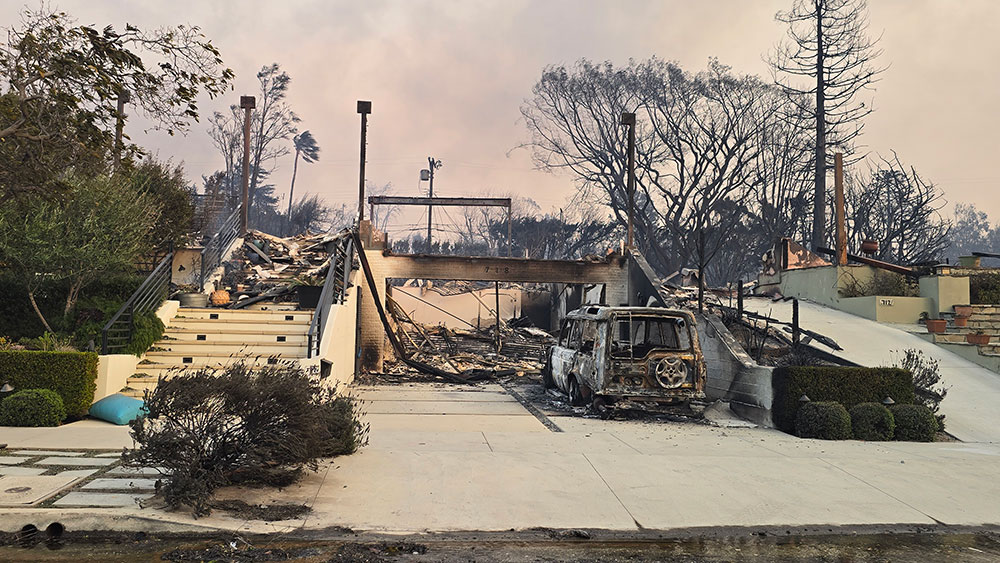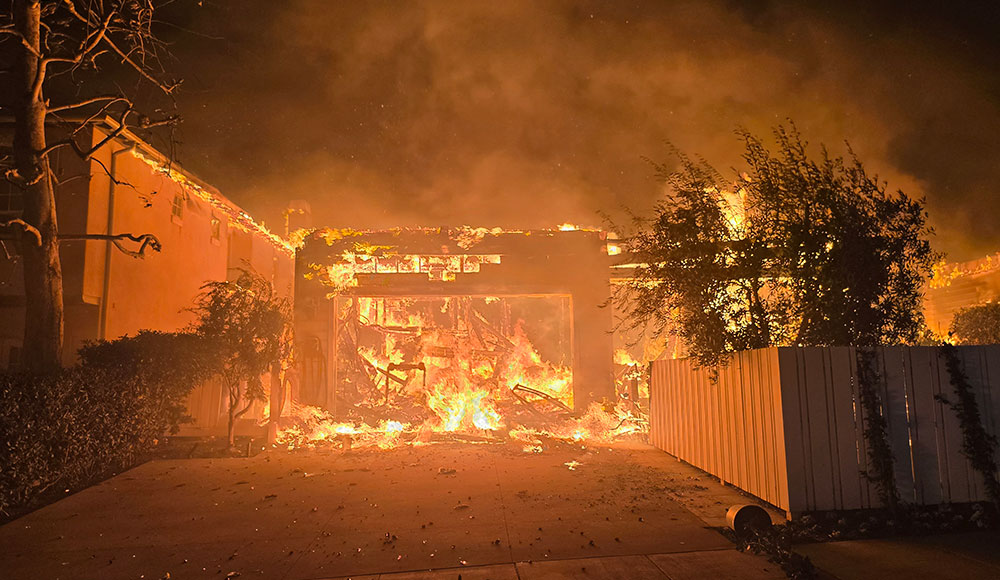Extreme photojournalist Alekz Londos, and his most recent content of Los Angeles burning, garnered him a spot on Fox News, where his videos went viral, with millions of views.
“Fox let me know that I couldn’t talk about climate change or politics,” Londos said from his home in Santa Cruz. “If I could have, I would have talked about the erratic wind speeds, climate-related disasters and weather-related anomalies.”
Londos spent eight years at Cabrillo College studying fire technology courses, and learning all he could about disaster survival. In the case of LA, Londos is quick to relate his studies to the still-happening catastrophe.
He and his cameras have covered 60 forest fires, seven hurricanes and the aftermath of Hurricane Katrina. He also went to Nepal after an earthquake, Ghana during the Ebola outbreak, and volunteered in Syrian refugee camps. During Hurricane Hugo, he slept in a windblown parking garage while others fled New Orleans.
But, according to Londos, LA was different.
“It’s so hard to even comprehend what it’s like. It’s like a war zone. It’s literally like a war,” Londos says. But in this case, the enemy is fire, and the firefighters are the soldiers. Unlike the CZU Lightning Complex fires, this wasn’t about saving 637 homes. In LA, over 10,000 homes have been lost, so far.
“What’s flammable? All the paints, all the lacquers, the siding, the fossil-fuel-derived roofs, and all of the different components that go into the building of a house. The insulation is flammable, most products in the house are petroleum-based, and we love to live amongst trees, even in a severe drought. People are living outside their means,” Londos says.
Londos doesn’t hold back on his praise of the response of the firefighters. “They’re constantly just trying to save the homes they can, and unfortunately the reality is that they spend their time, and their limited resources, protecting the homes that have a higher chance of being saved.”

Maybe the homeowner had more defensible space, or home hardening techniques, or they didn’t stack wood piles next to the side of the house. And in the split-second decisions that firefighters have to make, homes are saved or lost. Combine this with there not being enough trained humans to make their way safely through neighborhoods to spot in advance for the firefighters, just to let them know that a savable house is just around the corner.
“As a journalist,” Londos begins, “I have reign of the entire area in the disaster zone. I’m already driving around and getting my content. And I saw a house that could be saved. I filmed it, drove around the block and found some firefighters, and showed them the video. They figured out the address, called it in, and the house was saved, no questions asked. I did that three times.”
Important to note that Londos is trained, experienced and follows protocol. But even the most experienced disaster chaser can be overwhelmed. “I was driving through one neighborhood, probably seven city blocks. Homes were on fire, other homes were already destroyed. I did not see a single firefighter. It just overwhelmed everyone, so fast.”
Londos is hoping to be able to reach out to young people through his social media (@envirolize), and has an urgent piece of advice.
“Expand your education, preferably at a community college, and try to diversify your information, so that you can learn more about people, animals and the world. Try to get a good grasp on what this world is about and how things work. And then you’ll be able to make more of an informed decision with how you spend your money, how you vote with your money, how you spend your time, and the direction that you choose to go in life.
“I think everything has to do with making informed decisions, and that also requires personal sacrifices in one’s life. Rather than watch that soap opera, spend more time trying to do things that improve your life. Make more calculated decisions of how you think about everything. Weigh out the pros and cons. Will your decisions help people and animals? Think about how you can help your family and the future generations of the world. Manifest the life that you want to create, and how you can help this society that we live in. And think about how you can find your place in that,” Londos concludes.
Back in Santa Cruz for a breather, Londos was still packed when the Moss Landing fire started and he headed out again.











